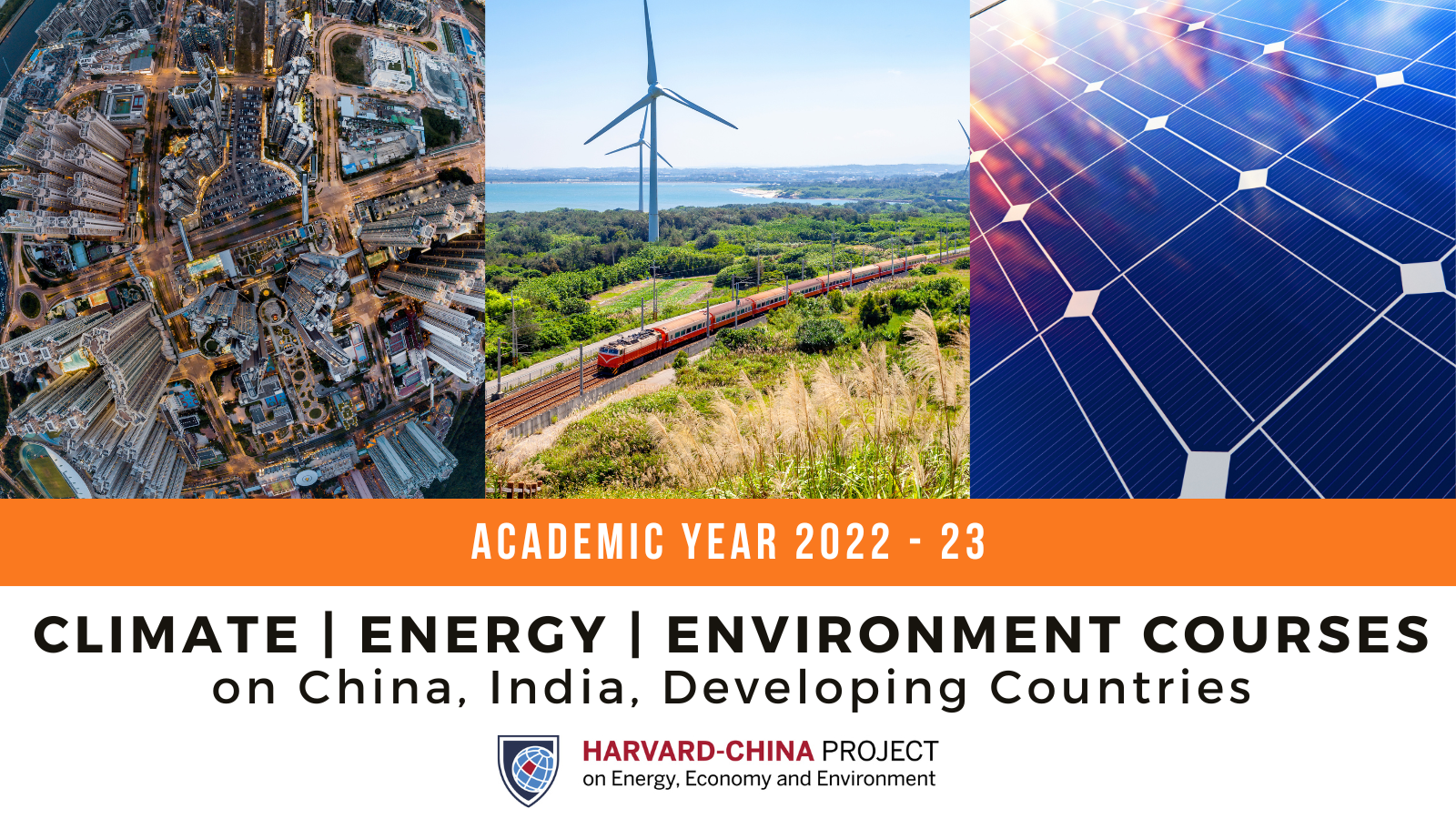

Sort by semester: Fall 2022 | Spring 2023
FALL 2022 SEMESTER
ESPP 90N. Addressing the Global Climate Crisis: Challenges for Both Developed and Developing Economies
Professor: Michael B. McElroy
Term: Fall 2022
Day: Th
Time: 3:00 – 5:45 PM
School: Faculty of Arts and Sciences
Course ID: 123858
Link: https://canvas.harvard.edu/courses/107932
The seminar will discuss the nature of the climate challenge and the implications it poses for different communities and different parts of the world. Mitigating negative impacts of human induced climate change will require an urgent transition from the current global fossil fuel-based energy economy to one based on renewable alternatives. Possibilities include wind, solar, hydro, biomass and potentially nuclear. The seminar will review options with specific attention to differences in the challenges faced by developed economies such as the US and Europe and large developing economies such as China, India and parts of Africa. Can we chart a feasible path to net zero global carbon emissions by 2050?
ESPP 171. Solid Waste In Developing Countries
Professor: Ken Thomas
Term: Fall 2022
Days: M, W
Time: 3:00 – 4:15 PM
School: Faculty of Arts and Sciences
Course ID: 220761
Link: https://canvas.harvard.edu/courses/111595
This course will examine major issues of solid waste (i.e. production, management, storage, treatment, disposal, infrastructure costs and financing, policy) in the developing world at various geographic locations and scales across municipal, industrial, electronic, biological/medical, and radioactive waste. Specific solid waste issues will be highlighted through in-depth case studies from Africa, Asia, Central and South America, Middle East, and Small Island Developing States. Analysis of the environmental commitment and regulations, appropriate technology availability and reliability, and key geopolitical factors that affect the amount of solid waste to be handled and how it is disposed of will be explored in all cases. To understand fundamentals in the developing world context, the course will compare how solid waste is managed in the developed and developing world at the local, state, and federal levels. Fundamentals cut across solid waste-related policies, transport, sources, collection, disposal/treatment, recycling, and material recovery. The course will emphasize – both quantitatively and qualitatively – the real-world challenges and systemic issues of the developing world that make solid waste planning and management complicated.
ADV 9127. Real Estate and City Making in China
Professor: Bing Wang
Term: Fall 2022
Day: M
Time: 1:30– 4:15 PM
School: Graduate School of Arts and Sciences
Course ID: ADV-9127
Link: https://www.gsd.harvard.edu/course/real-estate-and-city-making-in-china-fall-2022/
Real estate has increasingly become a compelling force in the process of city making, one uniquely capable of leading and guiding multiple steps in the construct of vital urbanism: from conceiving an idea to constructing complex structures; from sourcing funding to creating master-planned communities; and from negotiating design forms to implementing urban public realms. A country like China is at once experiencing rapid urbanization while undergoing unprecedented transformation in the mechanism of city making: the forces of real estate and the shifting roles played by public and private sectors are constantly challenging conventional city building models, while defining and redefining their positions in the production of the built environment. This course focuses on the interdependence between real estate and city making. It addresses both theoretical and empirical investigations on the concepts and paradigms that have shaped and are still shaping real estate practices and their impact on contemporary Chinese cities. It analyzes emergent real estate and urban development strategies, their respective financing structures, underlying domain expertise and urban organizational hierarchy.
IGA 413M. The Energy-Climate Transition
Professor: Henry Lee
Term: Fall 2022
Days: T, Th
Time: 12:00 – 1:15 PM
School: Harvard Kennedy School
Course ID: 218593
Link: https://canvas.harvard.edu/courses/109203
This module will look at the challenges and opportunities of transitioning from a dependence on fossil fuels to an economy reliant on low carbon energy sources. The module will focus on the electricity systems, buildings, and transportation in the context of the United States, China, and India. Students will be asked to develop recommendations on what should be done between 2023 and 2032 to accelerate the deployment of low carbon energy options to meet the Paris targets.
MGMT E-5625 Sustainability and International Business: Challenges, Opportunities, and Strategies
Professor: Maurie Kelly
Term: Fall
Days: Th
Time: 5:30– 7:30 PM
School: Harvard Extension School
Course ID: 14484
Link: https://courses.dce.harvard.edu/?details&srcdb=202301&crn=14484
Sustainability in international business is more than simply adopting sustainable practices—it has the potential to help companies gain competitive advantage. This course is designed to be highly interactive. We use articles, cases, group simulations, and videos to support learning and engage students. Students also have a chance to interact with each other through decision making exercises, simulations, and group discussions. The course explores the global business environment in the context of sustainability. It focuses on the meaning of sustainable development in relation to for-profit global corporations, the effect of sustainability on global corporate development strategies, and how corporations interact with nations across the globe positively and negatively. We examine the sustainability issues faced by different regions of the world such as Africa, Europe, Asia, and Latin America. Topics covered include corporate social responsibility, sustainability and strategic leadership, chemical and environmental pollution impacts, fast fashion and the apparel industry, labor rights and child labor, climate change impacts and opportunities, supply chains, renewable energy, food systems, and the role of consumers in sustainability. Companies examined include Walmart, Interface, UPS, Exxon, Patagonia, Ikea, Google, Unilever, Heineken, Nestlé, H&M, Adidas, and DuPont. Countries discussed include Brazil, Costa Rica, Nigeria, South Africa, Haiti, China, Singapore, Germany, Sweden, and the US.
SPRING 2023 SEMESTER
GENED 1137. The Challenge of Human Induced Climate Change: Transitioning to a Post Fossil Fuel Future
Professor: Michael B. McElroy
Term: Spring 2023
Days: T, Th
Time: 1:30 – 2:45 PM
School: Faculty of Arts and Sciences
Course ID: 120031
Link: https://locator.tlt.harvard.edu/course/colgsas-120031/2022/spring/17410
Human induced climate change has the potential to alter the function of natural ecosystems and the lives of people on a global scale. The prospect lies not in the distant future but is imminent. Our choice is either to act immediately to change the nature of our global energy system (abandon our dependence on fossil fuels) or accept the consequences (included among which are increased incidence of violent storms, fires, floods and droughts, changes in the spatial distribution and properties of critical ecosystems, and rising sea level). The course will be designed to provide students with an understanding of relevant physical, technical and social factors including an historical perspective. In the latter half of the course, the plan will be to engage students in an interactive dialogue on possible responses recognizing explicitly differences in motivations for different constituencies - for developed as distinct from developing economies for example. We plan to explore options for a zero carbon future energy system including the challenges involved in implementing the necessary transition. If we fail to abandon our dependence on fossil fuels - and the time scale over which we must do so to realize even the minimal objectives outlined in the recent Paris climate accord is as brief as a couple of decades or even less – might we need to explore possibilities for geoengineering, for purposeful intervention in the global climate system? Arguments for and against such options will be discussed and debated. We will expect students to be actively involved in exploring, researching and debating responses to any and all of these interrelated issues.
HIST 1610. East Asian Environments: China, Japan, Korea
Professor: Ian Miller
Term: Spring 2023
Days: T, Th
Time: 10:30 – 11:45 AM
School: Faculty of Arts and Sciences
Course ID: 205113
Link: https://locator.tlt.harvard.edu/course/colgsas-205113/2022/spring/16989
The future is not what it used to be. Nowhere is this more evident than in the natural world, where climate change and fading biodiversity, energy anxieties and environmental disasters have undermined the bedrock of history: the assumption of a stable continuity between past, present, and future. This class visits East Asia—China, Japan, and the Koreas, vibrant economies and agents of historical change, to explore the transformation of the natural world in modern times. We will analyze nuclear power plants and cruise rivers, explore industrial ruins and debate public policy as we define Asia’s role in the global environmental future.
ESPP 173. Water Resources in Developing Countries
Professor: Ken Thomas
Term: Spring 2023
Days: TBD
Time: TBD
School: Faculty of Arts and Sciences
Course ID: 219916
Link: https://locator.tlt.harvard.edu/course/colgsas-219916/2022/spring/20236
This course will examine major issues of water resources (i.e. water sources, supply, quality, treatment, use, distribution and storage, policy) in the developing world at various geographic locations and scales. Specific water resources issues will be highlighted through in-depth case studies from Africa, Asia, and Small Island Developing States. Analysis of the hydrological, technological, legal, and geopolitical factors that affect the availability of water for human consumption and agriculture will be explored in all cases. To understand fundamentals in the developing world context, the course will compare how water resources are managed in the developed and developing world. Fundamentals cut across water-related policies, water flows, water sources, water supply, water and wastewater treatment, water distribution, and water storage. The course will emphasize – both quantitatively and qualitatively – the real-world challenges and systemic issues of the developing world that make water resources planning and management complicated.
DEV 209: Management, Finance, and Regulation of Public Infrastructure in Developing Countries
Professor: Henry Lee
Term: Spring
Days: M, W
Time: 3:00– 4:15 PM
School: Harvard Kennedy School
Course ID: 170691
This course explores efforts to manage, finance, and regulate the transportation, water, sanitation, and energy infrastructure systems in developing countries. Issues to be discussed include public-private partnerships (PPPs), the fundamentals of project finance, contract and discretionary regulation, stakeholder involvement, and managing the political and strategic context in which infrastructure decisions are made. The course will rely on case material taken from infrastructure programs in developing countries, including Brazil, Mexico, Thailand, Laos, Argentina, Chile, Lesotho, Uganda, Madagascar, and India, as well as some developed countries, including the United Kingdom, Canada, and Australia.
ENVR E-185. The Food System: Environment, Health, and Ethics
Professor: Sparsha Saha
Term: January and Spring 2023
Day: T
Time: 5:10 – 7:10 PM
School: Harvard Extension School
Course ID: 26438
Link: https://courses.dce.harvard.edu/?details&srcdb=202302&crn=26438
The course has three units. In the first, students learn about the environmental, health, and ethical costs of animal agriculture (with a global focus though the United States is highlighted). Topics include: animal agriculture's impact on climate change, as well as other less well known planetary boundaries like biodiversity loss, nitrogen/phosphorus cycles, water use, and land use; animal agriculture's impact on health, including both communicable and non-communicable diseases; animal agriculture's ethical costs, with a focus on marginalized black and brown populations who disproportionately bear these costs. In the second unit, we turn our attention to the lack of attention on these costs in policy, with a focus on the United States. Here, the topics include: subsidies (highlighting the lack of public investment in alternative proteins, in contrast to the approach taken by other countries like Singapore, Israel, and China); regulation (explaining how factory farms are virtually unregulated due to exemptions and lack of willingness in the US); legislation or proposed legislation (including the Green New Deal, the Biden Plan, and the Paris Agreement). In the third unit, we showcase the vast array of actors who are part of the food systems shift. The course aims to show students that they have opportunities to be part of the change by connecting them with other actors in the space including policymakers and staff, industry leaders in the plant-based sector, health professionals, academics, and advocates and activists.
PLEASE NOTE: The Harvard-China Project has tried to ensure accuracy of all listed courses. For the most up-to-date listing, please visit the Harvard course catalog. As other related courses are added, they will also appear on our website.
